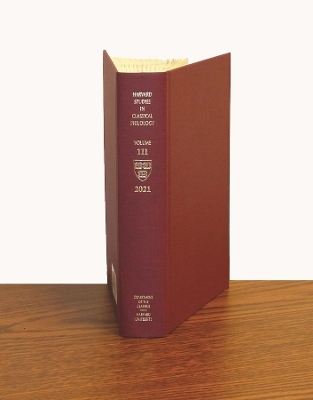
Harvard Studies in Classical Philology, Volume 111
Seiten
2022
Harvard Department of the Classics (Verlag)
978-0-674-26899-9 (ISBN)
Harvard Department of the Classics (Verlag)
978-0-674-26899-9 (ISBN)
Harvard Studies in Classical Philology Volume 111 includes Jessica H. Clark, “Adfirmare and Appeals to Authority in Servius Danielis”; Michael A. Tueller, “Dido the Author”; Charles H. Cosgrove, “Semi-Lyrical Reading of Greek Poetry in Late Antiquity”; and other new essays on Greek and Roman Classics.
This volume includes: Daniel Kölligen, “Ὄρθος, The Watchdog”; Richard L. Phillips, “Invisibility and Sight in Homer: Some Aspects of A. S. Pease Reconsidered”; Antonio Tibiletti, “Pondering Pindaric Superlatives in Context”; Matthew Hiscock, “Αὐθέντης: A ‘Mot Fort’ in the Discourse of Classical Athens”; James T. Clark, “Off-Stage Cries? The Performance of Sophocles’ Philoctetes 201–218, Trachiniae 863–870, and Euripides’ Electra 747–760”; Giuseppe Pezzini, “Terence and the Speculum Vitae: ‘Realism’ and (Roman) Comedy”; Neil O’Sullivan, “Quotations from Epicurean Philosophy and Greek Tragedy in Three Letters of Cicero”; Ernesto Paparazzo, “A Study of Varro’s Account of Roman Civil Theology in the Antiquitates Rerum Divinarum and Its Reception by Augustine and Modern Readers”; Joseph P. Dexter and Pramit Chaudhuri, “Dardanio Anchisae: Hiatus, Homer, and Intermetricality in the Aeneid”; Michael A. Tueller, “Dido the Author: Epigram and the Aeneid”; Benjamin Victor, Nancy Duval, and Isabelle Chouinard, “Subordinating si and ni in Virgil: Some Characteristic Uses, with Remarks on Aeneid 6.882–883”; Richard Gaskin, “On Being Pessimistic about the End of the Aeneid”; Gregory R. Mellen, “Num Delenda est Karthago? Metrical Wordplay and the Text of Horace Odes 4.8”; Kyle Gervais, “Dominoque legere superstes? Epic and Empire at the End of the Thebaid”; D. Clint Burnett, “Temple Sharing and Throne Sharing: A Reconsideration of Σύνναος and Σύνθρονος in the Hellenistic and Roman Periods”; Charles H. Cosgrove, “Semi-Lyrical Reading of Greek Poetry in Late Antiquity”; Byron MacDougall, “Better Recognize: Anagnorisis in Gregory of Nazianzus’s First Invective against Julian”; Alan Cameron, “Jerome and the Historia Augusta”; Jessica H. Clark, “Adfirmare and Appeals to Authority in Servius Danielis”; and Jarrett T. Welsh, “Nonius Marcellus and the Source Called ‘Gloss. i.’”
This volume includes: Daniel Kölligen, “Ὄρθος, The Watchdog”; Richard L. Phillips, “Invisibility and Sight in Homer: Some Aspects of A. S. Pease Reconsidered”; Antonio Tibiletti, “Pondering Pindaric Superlatives in Context”; Matthew Hiscock, “Αὐθέντης: A ‘Mot Fort’ in the Discourse of Classical Athens”; James T. Clark, “Off-Stage Cries? The Performance of Sophocles’ Philoctetes 201–218, Trachiniae 863–870, and Euripides’ Electra 747–760”; Giuseppe Pezzini, “Terence and the Speculum Vitae: ‘Realism’ and (Roman) Comedy”; Neil O’Sullivan, “Quotations from Epicurean Philosophy and Greek Tragedy in Three Letters of Cicero”; Ernesto Paparazzo, “A Study of Varro’s Account of Roman Civil Theology in the Antiquitates Rerum Divinarum and Its Reception by Augustine and Modern Readers”; Joseph P. Dexter and Pramit Chaudhuri, “Dardanio Anchisae: Hiatus, Homer, and Intermetricality in the Aeneid”; Michael A. Tueller, “Dido the Author: Epigram and the Aeneid”; Benjamin Victor, Nancy Duval, and Isabelle Chouinard, “Subordinating si and ni in Virgil: Some Characteristic Uses, with Remarks on Aeneid 6.882–883”; Richard Gaskin, “On Being Pessimistic about the End of the Aeneid”; Gregory R. Mellen, “Num Delenda est Karthago? Metrical Wordplay and the Text of Horace Odes 4.8”; Kyle Gervais, “Dominoque legere superstes? Epic and Empire at the End of the Thebaid”; D. Clint Burnett, “Temple Sharing and Throne Sharing: A Reconsideration of Σύνναος and Σύνθρονος in the Hellenistic and Roman Periods”; Charles H. Cosgrove, “Semi-Lyrical Reading of Greek Poetry in Late Antiquity”; Byron MacDougall, “Better Recognize: Anagnorisis in Gregory of Nazianzus’s First Invective against Julian”; Alan Cameron, “Jerome and the Historia Augusta”; Jessica H. Clark, “Adfirmare and Appeals to Authority in Servius Danielis”; and Jarrett T. Welsh, “Nonius Marcellus and the Source Called ‘Gloss. i.’”
Richard F. Thomas is George Martin Lane Professor of the Classics at Harvard University. Kathleen M. Coleman is James Loeb Professor of the Classics at Harvard University. Ivy J. Livingston is a Preceptor in the Classics at Harvard University.
| Erscheinungsdatum | 09.12.2021 |
|---|---|
| Reihe/Serie | Harvard Studies in Classical Philology |
| Zusatzinfo | 2 photos, 1 table |
| Sprache | englisch |
| Maße | 140 x 210 mm |
| Gewicht | 816 g |
| Themenwelt | Geisteswissenschaften ► Archäologie |
| Geschichte ► Allgemeine Geschichte ► Vor- und Frühgeschichte | |
| Geschichte ► Allgemeine Geschichte ► Altertum / Antike | |
| Geisteswissenschaften ► Sprach- / Literaturwissenschaft ► Anglistik / Amerikanistik | |
| Geisteswissenschaften ► Sprach- / Literaturwissenschaft ► Literaturwissenschaft | |
| ISBN-10 | 0-674-26899-7 / 0674268997 |
| ISBN-13 | 978-0-674-26899-9 / 9780674268999 |
| Zustand | Neuware |
| Informationen gemäß Produktsicherheitsverordnung (GPSR) | |
| Haben Sie eine Frage zum Produkt? |
Mehr entdecken
aus dem Bereich
aus dem Bereich
Was Pompeji über uns erzählt
Buch | Hardcover (2023)
Propyläen (Verlag)
32,00 €
auf den Spuren der frühen Zivilisationen
Buch | Hardcover (2023)
C.H.Beck (Verlag)
20,00 €


